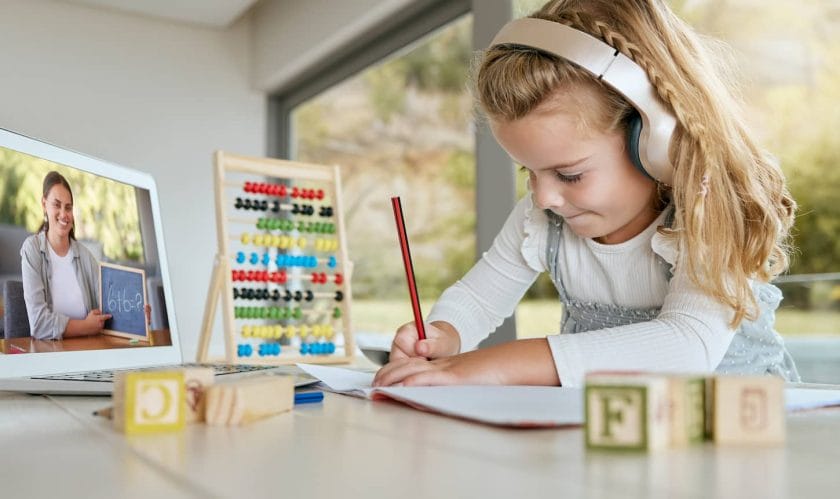When looking at any of the various schooling options for your children, it’s easy to become overwhelmed quickly. The sheer number of options alone is (understandably) daunting. So if you’re considering cyber school (or cyberschool) versus homeschool, how do you know which one to pick?
Cyberschool, or virtual school, may be more structured than homeschool if a schooling entity runs the virtual school. In that case, cyberschool would have a set curriculum and teachers to lead the lessons, while homeschooling would be up to the parents to run and determine the curriculum.
There’s more nuance to it than that, of course. So let’s dive into the differences – so you’ll better understand which option is right for your family.

Is Virtual learning the same as homeschooling?
Virtual learning is not always the same as homeschooling, as many school districts offer a virtual learning option. Virtual schooling can come with teachers and a curriculum, though learning is done at home.
For parents, one of the most complex decisions they make is about choosing how to educate their children. Several options, from in-person schooling to cyber school and homeschooling, can be explored. In this post, we will explore the differences between these three options.
First, we will look at the difference between cyber school and homeschooling. A cyber school is a form of online schooling.
This online learning is also known as:
- virtual schooling
- cyber schooling
- or e-school
Virtual learners spend 100% of their time learning online. Teachers and instructors are provided in virtual schools, and a predetermined curriculum is used. It may be offered through the public school system, or it can be privately funded.
On the other hand, homeschooling is provided by parents or tutors at home. The parents or tutors create a curriculum tailored to the children’s educational needs and interests. Children learn through projects and field trips and may use the internet as support.
Although virtual learning and homeschooling take place at home, many differences exist.
- Virtual learning: Certified teachers or instructors are provided in virtual schools. The teachers plan a predetermined curriculum.
- Homeschool learning: Parents are the teachers. In homeschooling, the parents decide the curriculum.
Both homeschooling and cyber school involve studying at home.
Our article here has more information on why virtual schooling isn’t always homeschooling: Is Online School Considered Homeschool?
Is virtual school a type of homeschool?
Virtual school is not usually a type of homeschool. Teachers and instructors are provided in virtual school, as is the curriculum. Whereas in homeschooling, parents are the instructors.
In virtual school, the curriculum is decided by the public or private school, while in homeschooling, the parent creates the curriculum. Parents may choose a faith-based program in homeschool, while in virtual school, if it is public, it is not available. However, some private virtual schools do provide faith-based learning. Homeschools may use online resources, but they are not virtual schools.
Pros and Cons Compared: Homeschool Vs. Cyber School
There are always pros and cons to any decision. Here are the pros and cons we’ve found for both options.
Homeschooling
Pros
- Flexibility
- Tailored curriculum
- Freedom to travel
- The parent is the teacher
- Different learning styles
- Can be faith-based
- No commute
- Custom schedule
- Can do projects with other homeschoolers
- Can take field trips with other homeschoolers
- There may still be standardized testing (state dependent)
Cons
- The parent is the teacher
- It can be harder to have a social life
- Have to figure out the curriculum
- It costs money (and no public funding)
- There may still be standardized testing (state dependent)
Virtual School
Pros
- Structure
- Curriculum is provided
- Teachers are provided
- No commute
- Can still be part of public school
- Teachers are available online
- Parents could work from home
- Students attend a live classroom (online)
- Scheduling flexibility
- Personalized curriculum
- Can be good for IEP’s
Cons
- Less in-person interaction
- It depends heavily on technology
- A lot of screen time
- Motivation may be a concern
- Too much sitting
Who is more Successful: Homeschooled Students or Cyber School Students?
Both homeschooled and cyber schooled students may be successful; current data is limited, and cyber or online schooling needs growth and improvement to get reliable, consistent data to determine which is better.
A lot of data exists about homeschoolers but there is far less about cyber students. Because there are so many types of cyberlearning, it is hard to have consistent data on how the students are doing.
Cyberlearning is relatively new. It began in the mid-1990s; therefore, there is not enough research on how the students are doing. Some students take an online course to make up for a failed class; therefore, they may not perform as well.
Online learning for K-12 students in the United States has emerged out of scattered and inconsistent trends, causing it to develop sporadically in a number of different types. Meanwhile, the limited research about online learning that does exist suggests that the practice needs substantial growth and improvement.”
An Overview of Online Learning in K–12 Education across the United States (source)
Is Virtual School Better than In-Person School? Or Is In-Person School Better than Virtual School?
Which is better (virtual schools vs in-person) depends on the student and family’s needs. However, virtual students tend to perform more poorly on standardized testing than brick-and-mortar-educated students.
- Students who need flexibility or to stay home may do better with virtual school than in-person schooling.
- Students who need in-person teaching or social interaction will typically do better with in-person schooling than online options.
Virtual schools may be a good option for families traveling or working abroad. It may work well for children who are very organized and independent. With virtual learning, parents must be more involved in their children’s learning. It may also be a good option for a child with a chronic illness. Some parents choose virtual learning for their children due to bullying issues at in-person schools.
As proponents continue to make the case that virtual education can expand student choices and improve the efficiency of public education, full-time virtual schools have attracted a great deal of attention. Advocates contend that this potential for individualization allows virtual schools to promote greater student achievement than can be realized in traditional brick-and-mortar schools. NEPC researchers found, however, that the research evidence does not support this claim.
Virtual Schools in the U.S. 2019 (source link)
In other words, they need to do more research. Here are a few more things that the same study found. I’m jumping around a bit in this next quote, but tying it together so it makes sense in context.
As reported in previous NEPC virtual schools reports, the number of virtual schools in the U.S. continues to grow… Full-time virtual schools deliver all curriculum and instruction via the Internet and electronic communication, usually asynchronously with students at home and teachers at a remote location…. Section II reviews research relevant to K-12 virtual and blended learning. The available research has consistently found that students enrolled in full-time virtual schools perform at levels well below their counterparts in face-to-face schools.
In other words, standardized tests back up the claim that students with in-person schooling usually do better on tests than kids who did school online. However, whether standardized tests matter is an entirely separate question. And there are a lot of hot opinions on that, so we won’t go into that right now.
There’s a lot to weigh here, so we wanted to ensure this all got covered.

Is Homeschooling Better than In-Person School?
Which is better between homeschooling and in-person school depends on the student’s learning style, family needs, and numerous other circumstances that should be considered when making this decision.
Here are a few considerations (or circumstances) that could help you decide.
- Homeschooling is better if you want the freedom to tailor the program to your child’s unique learning styles and needs.
- If you want your child to follow a specific curriculum and not have to be there, then in-person school is better.
- If you work outside the home and cannot be with your child, in-person school is better.
- If you want your child to be in a more structured environment with a predetermined curriculum, in-person school is probably the right choice.
Homeschooling allows parents to create a curriculum tailored to their children’s unique interests.
It allows parents and children more freedom to choose what they study, when they study, and how they study. It can be based on projects and be more hands-on. They can take field trips and join other homeschoolers for events and field trips. Homeschooling may be your best option if your home includes a stay-at-home parent. If you homeschool, you can incorporate your faith, religion, or spirituality into the curriculum.
As far as who performs better on standardized tests? Homeschooled children tend to perform better on both the ACT and the SAT.
Higher performance: According to ThinkImpact, public school students received an average score of 21 out of 36 on the ACT, whereas homeschooled students received an average of 22.8. As for the SATs, homeschoolers scored a nationwide average of 72 points more than their traditional schooled counterparts in the United States in 2020.
(source)
When Should I Pick Virtual School Versus Homeschool?
In general, pick virtual school if your student would benefit from learning at-home, but you don’t have the time and resources to be the teacher or manage the curriculum. However, if you have the time and resources to manage the curriculum and want to do so, then you can pick homeschooling.
Virtual school makes sense if you stay or work at home and do not have the time to be your child’s full-time teacher. Virtual school is the best option if your child has a temporary illness and will be going back to in-person schooling. Virtual school is the best option if you want a certified teacher. A virtual school is a great option if you want a predetermined curriculum.
Homeschooling may be the right option for a specific child or family, as virtual school may be the correct choice for a particular child or family. If you want a program more tailored to your child’s interests and educational needs, homeschooling is the right option.
Virtual schooling is the right choice for your family if you want a more structured program with a predetermined curriculum. Some states require standardized testing and assessments, and other states do not.
For some families, homeschooling may be the better option, and for other families, virtual schooling is the best choice in deciding how to educate your children.
Before deciding to homeschool, it is important to research your state’s laws regarding homeschooling testing. You’ll want to read our guide on How Do I Take My Child out of School to Homeschool? so we can point you in a few right directions (and give you important tips!).

Key Takeaways and Next Steps
As we have seen, parents have several options when deciding how to educate their children. We’ve talked (in general) about three of those options:
- homeschooling
- virtual schooling
- in-person school.
Every parent and every child has unique abilities which will determine which one is best. Every family has its unique needs. It is important to take your time and research what your area has to offer and then make the right decision for your child and family.
What works for one child may not work for another child. Also, your child’s and your family’s needs may change. So don’t be afraid to adapt. We’ve certainly adapted over the years!
Want to try things on a temporary basis, rather than fully committing? Read our article answering that here: Can I Homeschool My Child Temporarily?
Resources
Learning from your own experience is important, but learning from others is also smart. These are the sources used in this article and our research to be more informed as homeschoolers.
- Homeschooling vs Traditional Schooling: pros and cons – Crimson Education US. (n.d.-b). Crimson Education. https://www.crimsoneducation.org/us/blog/junior-prep/homeschooling-vs-traditional-schooling-pros-and-cons/
- Mann, B. (2017, March 18). An Overview of Online Learning in K–12 Education across the United States. Wiley Online Library. Retrieved March 3, 2023, from https://onlinelibrary.wiley.com/doi/abs/10.1002/9781118926895.ch11
- Molnar, A. (n.d.). Virtual Schools in the U.S. 2019. https://eric.ed.gov/?id=ED595244
